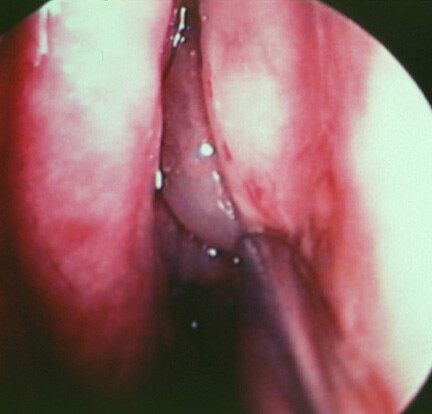Nasal polyp is a growth of the nasal mucous membranes that are benign.
CAUSE
The cause of polyps is unknown, but some polyps grow because of the swelling due to infection.
Polyps are commonly found in people with:
allergic rhinitis
asthma
chronic sinusitis
Cystic Fibrosis.
SYMPTOMS
Polyps are usually grown in areas where the mucous membranes to swell due to fluid retention, such as sinus area around the hole in the nasal cavity.
When newly formed, a polyp looks like a tear and if it has matured, its shape resembles that of grapes grayish.
Polyps causing nasal blockage, so patients often complain of decreased sense of smell function.
Because the sense of taste associated with the sense of smell, then the patient may also experience decreased sense of taste and smell function.
Nasal polyps can also cause a blockage in the drainage of mucus from the sinuses to the nose. This blockage causes the accumulation of mucus in the sinuses. Mucus that is too long in the sinuses can become infected and eventually sinusitis.
People with children often nasal voice and breathe through his mouth
Polyps are usually grown in areas where the mucous membranes to swell due to fluid retention, such as sinus area around the hole in the nasal cavity.
When newly formed, a polyp looks like a tear and if it has matured, its shape resembles that of grapes grayish.
Polyps causing nasal blockage, so patients often complain of decreased sense of smell function.
Because the sense of taste associated with the sense of smell, then the patient may also experience decreased sense of taste and smell function.
Nasal polyps can also cause a blockage in the drainage of mucus from the sinuses to the nose. This blockage causes the accumulation of mucus in the sinuses. Mucus that is too long in the sinuses can become infected and eventually sinusitis.
People with children often nasal voice and breathe through his mouth
Diagnosis
Diagnosis is based on symptoms and physical examination.
Diagnosis is based on symptoms and physical examination.
TREATMENT
A nasal spray containing corticosteroids (dexamethasone, cortisone, hydrocortisone, prednisone, metilprednison, fluticasone, mometasone, budesonide) can sometimes reduce the size of the polyp or even remove polyps.
Surgery is done if:Polyps obstruct the respiratory tractPolyps obstruct sinus drainage from a sinus infection that often occursPolyps associated with tumors.
Polyps tend to grow back if the cause (allergy or infection) was not controlled.The use of a nasal spray containing corticosteroids can slow or prevent recurrence. But if the recurrence is its weight, should be done surgically to improve sinus drainage and dispose of infected material.
PREVENTION
You can help reduce your chances of experiencing a recurrence of nasal polyps or nasal polyps after treatment with the following prevention strategies:
Adjust the allergy and asthma. Follow the doctor's treatment recommendations for managing asthma and allergies. If symptoms are not easily and regularly under the control of, consultation with your doctor about changing your treatment plan.
Avoid irritants. Whenever possible, avoid things that are likely to contribute to inflammation or irritation of your sinuses, such as allergens, air pollution and chemicals.
A good clean living. Wash your hands regularly and thoroughly. This is one of the best ways to protect against bacterial and viral infections that can cause inflammation of the nose and sinuses.
Humidify your home. Use a humidifier if you have dry air in your home. This can help increase the flow of mucus from your sinuses and can help prevent blockage and inflammation.
Use a nasal rinse or nasal lavage. Use saline (salt water) spray or nasal lavage to rinse your nose. This can increase mucus flow and eliminate allergens and irritants. You can buy saline sprays or nasal lavage with a device, such as straw, to mngantarkan rinses. You can create your own solution by mixing 1/4 teaspoon (1.2 ml) salt with 2 cups (0.5 liters) warm water. Avoid the salt water spray containing additives which can burn the mucous lining of your nose.
A nasal spray containing corticosteroids (dexamethasone, cortisone, hydrocortisone, prednisone, metilprednison, fluticasone, mometasone, budesonide) can sometimes reduce the size of the polyp or even remove polyps.
Surgery is done if:Polyps obstruct the respiratory tractPolyps obstruct sinus drainage from a sinus infection that often occursPolyps associated with tumors.
Polyps tend to grow back if the cause (allergy or infection) was not controlled.The use of a nasal spray containing corticosteroids can slow or prevent recurrence. But if the recurrence is its weight, should be done surgically to improve sinus drainage and dispose of infected material.
PREVENTION
You can help reduce your chances of experiencing a recurrence of nasal polyps or nasal polyps after treatment with the following prevention strategies:
Adjust the allergy and asthma. Follow the doctor's treatment recommendations for managing asthma and allergies. If symptoms are not easily and regularly under the control of, consultation with your doctor about changing your treatment plan.
Avoid irritants. Whenever possible, avoid things that are likely to contribute to inflammation or irritation of your sinuses, such as allergens, air pollution and chemicals.
A good clean living. Wash your hands regularly and thoroughly. This is one of the best ways to protect against bacterial and viral infections that can cause inflammation of the nose and sinuses.
Humidify your home. Use a humidifier if you have dry air in your home. This can help increase the flow of mucus from your sinuses and can help prevent blockage and inflammation.
Use a nasal rinse or nasal lavage. Use saline (salt water) spray or nasal lavage to rinse your nose. This can increase mucus flow and eliminate allergens and irritants. You can buy saline sprays or nasal lavage with a device, such as straw, to mngantarkan rinses. You can create your own solution by mixing 1/4 teaspoon (1.2 ml) salt with 2 cups (0.5 liters) warm water. Avoid the salt water spray containing additives which can burn the mucous lining of your nose.

0 comments:
Posting Komentar